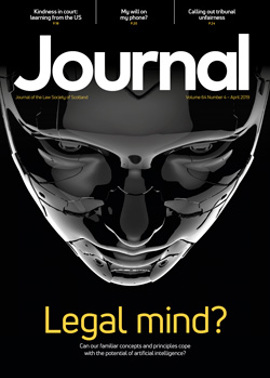Love my tender

“The prerequisite for empathy is simply paying attention.” (Daniel Goleman)
I write this on one of the most significant days in modern British history, when MPs hold a second series of indicative votes on the boulder-strewn path towards Brexit. There have been many criticisms of how the Government has handled the whole grisly process. But as someone who has spent a professional lifetime negotiating, it has reinforced for me how important it is to have not just the better arguments, but empathy with your opposite number.
It is a long drop from the heights of international statecraft (or the lack of it) to pitching as a supplier of legal services, but we can learn a lot from the mistakes of our political masters. And let’s face it, some of us have much to learn. There are distinguished exceptions, but in general, there are few more enervating experiences than the average law firm pitch. Time after time, buyers endure death by PowerPoint, as firms drone on about their unrivalled experience, supreme track record, encyclopaedic knowledge of their target’s business and general all-round perfection. Nor is the presentation document on which this dirge is based, likely to be a candidate for the Pulitzer. “An inert leviathan of tedium” is one of the kinder descriptions I have come across.
Emotion rules
Lawyers have fantastic facility with language, so what explains this dismal performance? A number of factors are at play: caution; uncertainty; a desire to appear “professional”, which obliterates any possibility of revealing a personality; the belief that dry facts and analysis, rather than making a human connection, are what matters most; above all, the mistake made time and again to focus 99% on the message, and give little or no thought to the character and priorities of the recipient. Despite the spreadsheets, charts, and minutely detailed questionnaires beloved of procurement managers, we humans make 84% of our decisions by emotion and only 16% by analysis. There is no better example of this than the result of the Brexit referendum, and the subsequent polarisation of Parliament and wider society. We can’t help it. This is who we are. But as Jacob Rees-Mogg might counsel in his unaffected way, nil desperandum. There are simple changes that can make a tremendous difference.
Tender invitations may sometimes look generic, but they are not. Every buyer will have a different order of priorities, and it should be clear what they are.
If, as happens, the brief is so badly written that it isn’t clear, ask. Your response must exude that you have understood, and are responding thoughtfully to all the nuances of what the buyer has said. Quote their text back to them: “You have told us that...”, and then say, in detail, “This is our offering, this is how we have tailored it for you, and this is why it is exactly what you need.”
Secondly, write like a journalist, not a lawyer. If journalists can’t connect, they don’t eat. Use their tools and techniques: plain English; short sentences; personal stories; no jargon; no bullet points; evidence; punchy conclusions. Corroborate your claims to greatness with testimonials and case studies. Talk about your values, and demonstrate how you live by them, lest they be mistaken for motherhood and apple pie.
Only connect
If your proposal is good enough to get you in the room, remember that the key to success is connecting, and that means lively dialogue. In his excellent book, Perfect Pitch, Jon Steel, a former senior executive with WPP, tells how he was once asked by Apple to sit on a procurement panel. All day, he and his colleagues were assaulted by slick slides and pithy promises. By the time they had only one presentation to see, they were feeling that “having a heart attack was the only way out”. Then the door opened, and instead of the battalion they were expecting, armed to the teeth with literature and technology, in came one unassuming man, armed with nothing but himself and a laptop in a bag. He made to take it out, but thought better of it. Instead, he took a chair and sat down in front of the panel.
“Do you mind? he asked, “I’d really like to just have a chat.” “We could,” says Steel, “have kissed him.” He talked knowledgeably for 40 minutes. The coup de grâce for the panel was when he had the integrity to admit that his firm couldn’t do everything the tender asked for, though it was very good at what it could do. Naturally, he came away with a pile of business.
All advocacy is, at its core, an exercise in empathy, said Samantha Power, former US ambassador to the United Nations – at last, a PowerPoint worth pondering.
In this issue
- Time to promote shared care?
- Client medical records: a matter of right
- Search for the route to healing
- Rights after “same roof”
- Are you a qualified creditor?
- Reading for pleasure
- Opinion: Allan Jamieson
- Book reviews
- Profile: John Laughland
- President's column
- ScotLIS update
- People on the move
- Common law and artificial life
- FAIs: addressing the concerns
- Challenging times
- Shared humanity
- Cases of the paperless will
- How to manage your legal practice for success
- Fairness v Convenience
- Moorov then and now
- Personal licences: the uncertainty continues
- Is Airbnb use a planning matter?
- Insolvency Rules: a positive realignment
- IR35 compliance moves up the ladder
- “Best interests” in the balance
- Scottish Solicitors' Discipline Tribunal
- PSG tackles index-linked rent reviews
- Finding the right seat
- Public policy highlights
- Accredited paralegal update
- Events, and more, for members
- Accredited Paralegal Committee profile
- Second thoughts on executor declarations
- Client communication – a continuous journey
- Reflections from the Commission
- Love my tender
- Ask Ash






